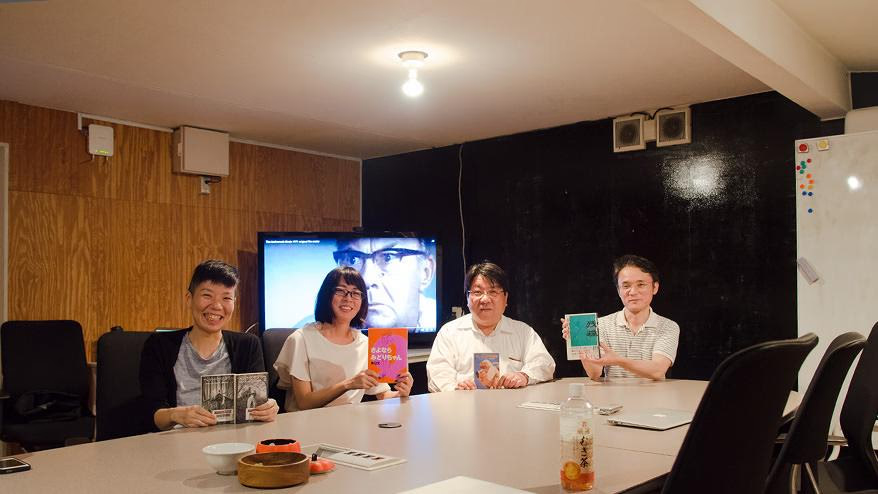図書委員長の村上です。
秋といえば「読書の秋」。「読書の秋」の由来は、韓愈(かんゆ)の詠んだ「灯火親しむべし(灯火のあかりで本を読む)」という詩とのこと。部屋のあかりで本を読みふけるのに適した季節ということなんです。
そんな時期に選んだお題は「映画化された本」。
本もいいけど映画も観たくなるこの季節、だったらどっちも楽しもう!ということで決まったテーマです。
参加者は、お菓子大好きな私、村上(品質管理部リーダー、図書委員長)と、同じくお菓子に目がないがお酒も好きな上井(プロジェクトマネージャー)、大学では映画の脚本を書き、自主映画をつくっていた田中(コーダー、ディレクター)、東京のよさは映画がたくさん観れること!と言い切るシネフィル和田(ディレクター)の4名。
それでは、読書会スタートです!

本日のおやつはハローウィンをテーマに、かぼちゃチョコ、かぼちゃクッキー。右の緑のうねうねしているのは夏のなごりということでゴーヤまるごとスナックをセレクト。
発表タイム
40分間の読書タイムを終えたら、ひとり5分間でその本を紹介します。
-
怖いのはマンションじゃなくて、その土地?
小野 不由美 (著)『残穢』(紹介者:村上 伊左夫) -
重大な危機は、ほんの少しの見過ごしから
『アンドロメダ病原体』(紹介者:上井正之) -
「好きだからダッシュ」の先で見たいのは、彼じゃない、彼女の顔なんです。
南 Q太「さよならみどりちゃん」(紹介者:田中夏海) -
生死をあやつる禁断の土地。一度でも足を踏み入れると…
スティーヴン キング『ペット・セマタリー』(紹介者:和田亜也)
怖いのはマンションじゃなくて、その土地?
小野 不由美 (著)『残穢』(紹介者:村上 伊左夫)
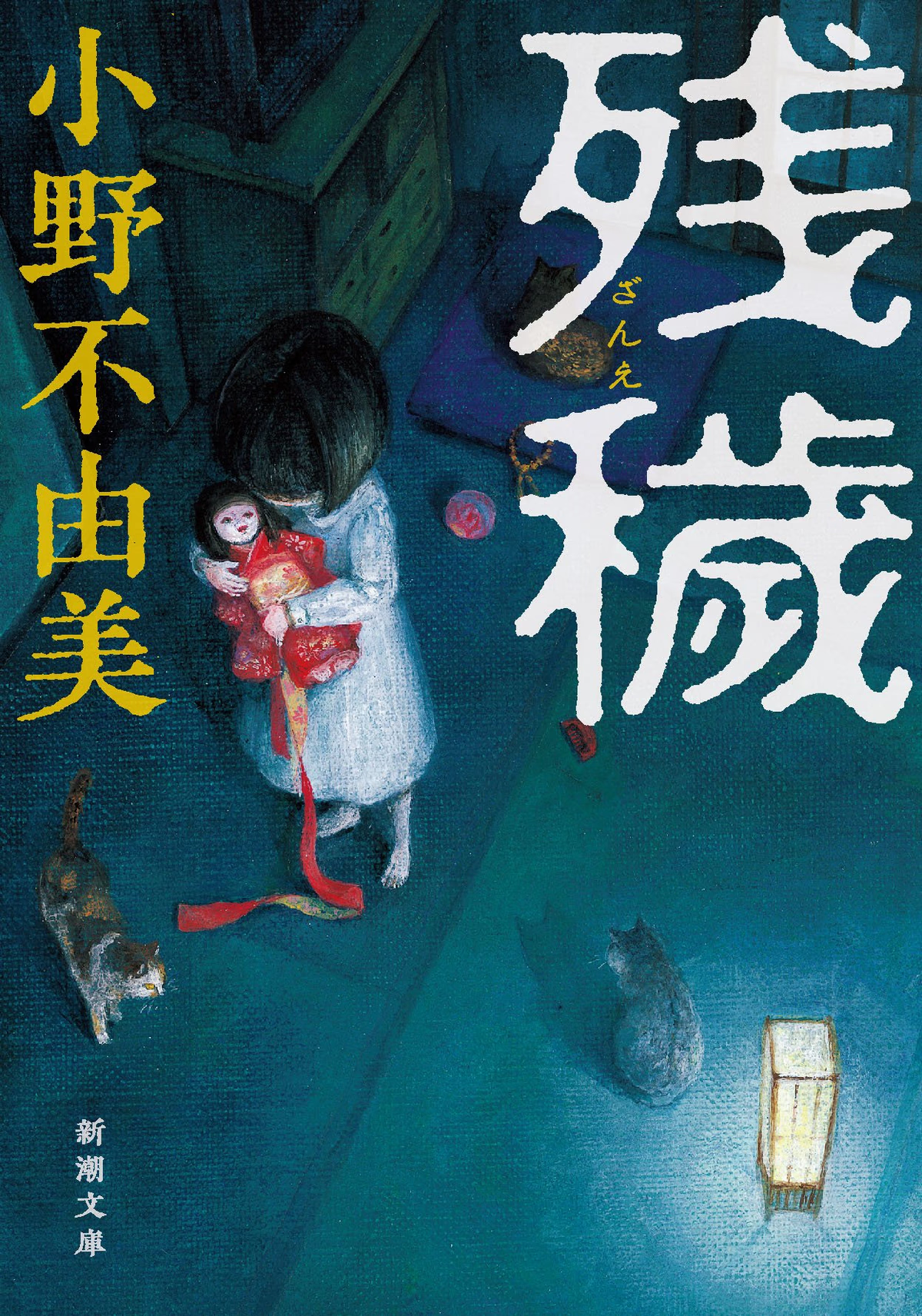
小野 不由美 (著)『残穢』新潮社 2015( Amazon )
-
 村上
村上 -
作者の小野不由美さんが好きなんですが、「十二国記」や「屍鬼」などアニメ化された作品をきっかけで読むようになりました。この『残穢(ざんえ)』はホラー小説ですが、お化けとかはあんまり出てこない感じです。「いる」と思えば「いる」というような。
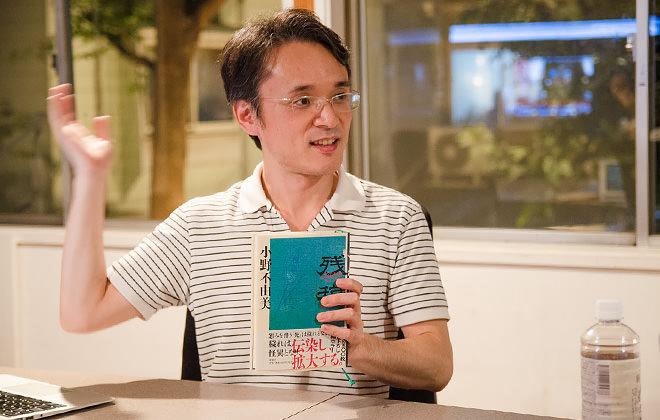
-
 村上
村上 -
主人公の「私」は作家で、おそらく作者本人が想起されるようにしています。「私」はその昔、中高生向け小説のあとがきに「怖い話があったら送ってください」と書いたことがあって、いまだにその頃の読者から手紙が届くことがあるんです。
あるとき、久保さんという女性読者から、家にいると時々うしろの和室から「さっ…」っという音が聞こえるという手紙が来て、そこからやり取りがはじまります。換気扇の音かな、じゃぁ切ってみたらとか、ドアを締めてみたりとか色々試してみるんですが、その部屋を見ていると何も起きず、背を向けると音がする。
結局、気のせいだということに落ち着くんですが、また音が聞こえて…あるとき振り向くと、何か着物の帯のようなものが見えたんです。これはなんだろうと二人は謎を追いますが、実は「私」はこの話に聞き覚えがあると思っていて。そんなとき荷物を整理していたら、別の読者からの手紙に似たような話があって、その住所が久保さんと同じマンションの別の部屋だったという。
そこから、このマンション自体おかしいんじゃないかという話になって、取材しながら検証していくんですが、実はおかしいのはマンションでもなく、この土地なんじゃないかと…そんな風に原因を追っていく話です。
すごく怖いものが出てくるというよりは、考えていくと怖いかもしれない、という…。
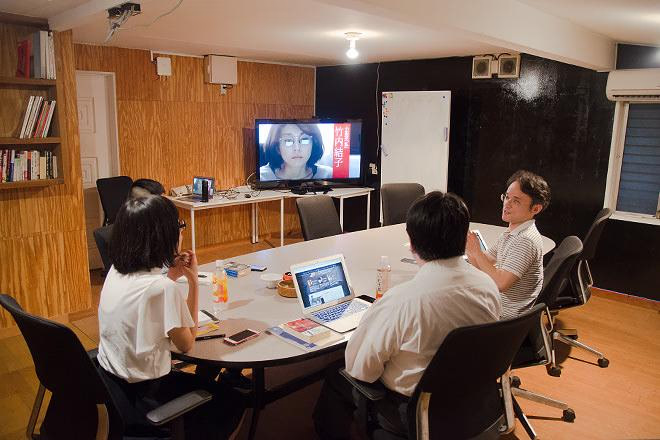
-
 田中
田中 -
まろさん(※村上の愛称)の声が、なんかホラー映画の語り部みたい(笑)。
-
 和田
和田 -
最終的に音の原因は何だったのかわかってくるんですか?
-
 村上
村上 -
だんだんわかってくる。すごい取材していくんです、小説のなかで何年も経つんですよ。ちなみに、小説では久保さんは30代のライターですが、映画では20代の学生に設定が変わっています。
-
 田中
田中 -
一番怖いって思ったのってどんなところですか?
-
 村上
村上 -
うーん、怖いっていうか。さっき、土地がおかしいんじゃないかという話をしましたが、「土地」っていうものを考えると、過去何もなかったってことはないと思うんですよね。必ず誰かは死んでいるだろうし、さらに何百年と遡ると無念の死を遂げた人もいるだろうし。
そういう怨念は何年経てば消えるのかとか、想像するところがあって。ま、それが結末…ではないですけど、一つの解答というか落とし所に通じる部分もありますね。
-
 和田
和田 -
結末が気になります。
-
 村上
村上 -
読んでいくと、実はすっごい人が死んでいることがわかってきます。
怨念ではないんですけど、事実としてそういうことがわかってくる。
-
 田中
田中 -
死んでるって言ったときが一番うれしそう。
『残穢 -住んではいけない部屋-』監督:中村義洋 2016年 松竹
重大な危機は、ほんの少しの見過ごしから
『アンドロメダ病原体』(紹介者:上井正之)
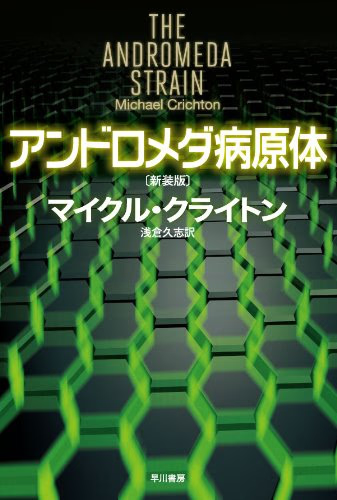
マイクル・クライトン (著)『アンドロメダ病原体』早川書房 新装版 2012( Amazon )
-
 上井
上井 -
SFが好きなんですけど、一番好きなマイケル・クライトンの小説を持ってきました。彼の作品はたくさん映像化されていて、ジュラシックパークやディスクロージャー、あ、ERの原案もそうですね。
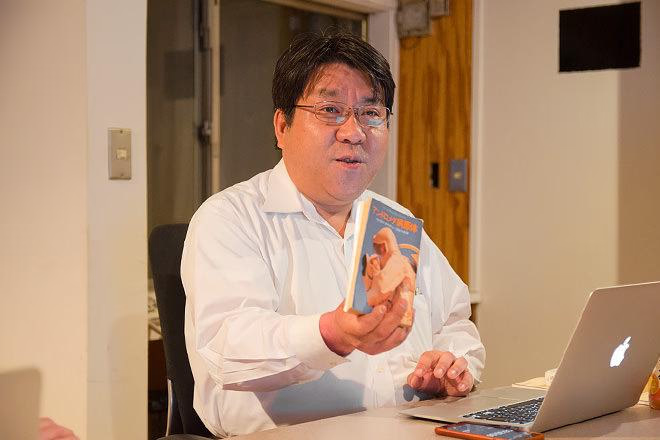
-
 上井
上井 -
この『アンドロメダ病原体』は、1960年代の東西冷戦時のアメリカが舞台です。地球外生命体の兵器化を目的とした人工衛星をつかった軍の実験で、ある村に着陸した衛生を軍が回収に行くと、村人が全滅していた。その正体を突き止めるために、複数の分野の科学者が隔離された研究に集められて、未知の生命体の解析に挑むんです。この「ワイルドファイヤー計画」と呼ばれるプロジェクトの研究施設で起こった数日間の出来事が、報告書と記録という形で淡々と語られる小説です。
物語は3つの時系列で進んでいきます。科学者たちが集められている研究施設、全滅した村の後始末をしている軍隊、それを統括する大統領がいるワシントン。それぞれの人が、それぞれの場所で、良かれと思ってやっていくことが、最終的に研究施設を壊滅してアウトブレイクに結びつくような危機を引き起こす、っていうのが淡々と描かれています。
なので、映画も「面白い」っていう映画じゃないんです。それぞれのところで、時間の経過とともに物語が進んでいく感じ。マイケル・クライトンの小説って、物語の最初に、ちょっとしたことの見過ごしがあって、それが最後の方で重大な危機を巻き起こすことに結びつくことがあって…。
(5分終了の合図)

-
 田中
田中 -
「最初にあれやっとけば〜!」みたいなのいいですよね。
-
 上井
上井 -
こう、論理的に物語を進めていくんだけど、実は最初のところでちょっと踏み違えちゃった、導き出す答えが危機的状況を引き起こすような引き金になってるというか。それぞれがベストを尽くしていくんだけど…
-
 田中
田中 -
どんどん破滅と言うか。
-
 上井
上井 -
…に結びつくような。
-
 村上
村上 -
地球外生命体がいるっていうのは前提としてあるんですか?
-
 上井
上井 -
あ、そうです。マイケル・クライトンって小説を書くときに、科学的な新しい学説も取り入れてて。地球の生命の起源になったアミノ酸って隕石に付着してたんじゃないかという説から、大気圏を突破してくる生命体が村人を全滅させるような毒性を持ってる、というのが物語のスタートになっています。
-
 田中
田中 -
映画の監督はだれですか?
-
 上井
上井 -
監督は…あ、ロバート・ワイズか。
-
 田中
田中 -
「市民ケーン」の監督の人!いいですね。
-
 上井
上井 -
リメイク版は、リドリー・スコット。
-
 田中
田中 -
ああああ。市民ケーンの盛り上がりと比べるとあれかもしれない(笑)。
『アンドロメダ…』監督:ロバート・ワイズ 1971年 ユバーサル映画
「好きだからダッシュ」の先で見たいのは、彼じゃない、彼女の顔なんです。
南 Q太「さよならみどりちゃん」(紹介者:田中夏海)
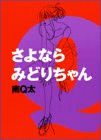
南 Q太 (著)『さよならみどりちゃん』祥伝社 1997( Amazon )
-
 田中
田中 -
私が紹介するのは、南Q太の『さよならみどりちゃん』です。映画を観たあとに、原作のマンガを読みました。
OLのゆうこちゃんが、ユタカっていうめっちゃクズ男に引っかかって、色々あるよっていう、ま、そういう青春恋愛マンガです。このユタカってのが、まあ、本当にクズで、ゆうこちゃんと仲良くなっちゃったあとに「オレ彼女いるんだよね」「でもオレたち友達だよね」「こういう感じもいいよね」みたいな。もう本当に。どうしようもないクズ男。でもすっごい優しくてむちゃくちゃ顔がカッコいいという。なんか…そういう人なんですよ(笑)。
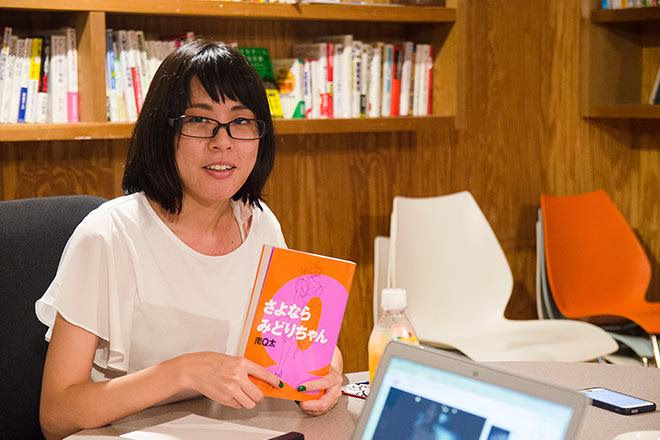
-
 田中
田中 -
この二人、あんまり他人と真剣に向き合わないタイプで、波風が立つことをとにかく嫌うんです。ユタカは上手くはぐらかすんですけど、ゆうこちゃんはそこまで明るくないから我慢しちゃう。お金を稼ぐためにスナックで働けって言われて、夜も無理して働いちゃうみたいな。周りはわりとガンガン来る人たちなんだけど、この二人は最後の2pくらいまで全然変わらないんですよ(笑)。
タイトルの「みどりちゃん」は、ユタカが長く付き合ってる彼女の名前なんですが、物語の最後で「オレみどりと別れたんだよね」てきいて、ゆうこちゃんはもう完全にユタカのこと好きになっちゃう。ちょっと期待しちゃうじゃないですか、行けるかな、みたいな。でもユタカは「俺たちこういう関係。ずっとこういう関係」みたいなことを言ってきて、そこでやっと二人は変わるっていう。それが最後の2pなんですけど。
ぶっちゃけ、話自体はそんなに面白くないんです(笑)
――――ポーン(5分終了の合図)
-
 村上
村上 -
ぶっちゃけた(笑)
-
 田中
田中 -
私がすごく好きなのは、映画の最後の方のシーン。これユタカがみどりちゃんを連れてタクシーに乗るところなんですよね。スナックで働かされてるゆうこちゃんは、エロオヤジに絡まれてて。なにこれー、もうユタカを追いかけたい!気になる!あー行っちゃった!でも今エロオヤジが!こっからですこっから。
こっからゆうこちゃんは二人が乗ってるタクシーを走って追いかけるんですけど、恋愛映画によくある「好きだからダッシュ」ってやつ、執着ダッシュみたいな(笑)。
星野真里走るなー
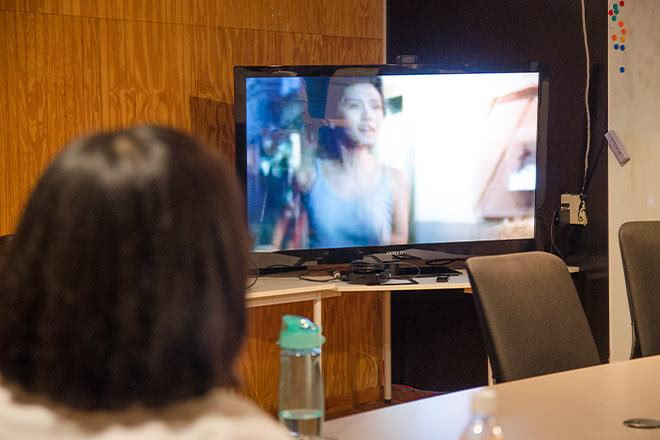
-
 田中
田中 -
ユタカのこと追いかけてんのかなー、捕まえてとっちめてやるみたいな感じかなーって思うんですけど…追いつきかけたときに、ゆうこちゃんはみどりちゃんの顔を見たがるんですよ。彼女はユタカくんよりも、ユタカくんを虜にするみどりちゃんの顔が気になったわけですよ。ここが私好きで。
上手く言えないんですけど、ここがいちばん好きです。

ユタカくんとみどりちゃんが乗ったタクシーに追いつくシーン。このあと、ゆうこちゃんはみどりちゃんの顔を覗こうとしたら結局見えないまま、タクシーは走り去って行った。
-
 田中
田中 -
あえて前に飛び出したりせず、必死にみどりちゃんの顔を見ようとする、好きな相手に好きだって言えないけど、みたいな…、こ、これ!
-
 村上
村上 -
そうなのか…
-
 田中
田中 -
そう、これ。これがオンナってやつです(笑)。
-
 和田
和田 -
原作にもこのシーンあるんですか?
-
 田中
田中 -
マンガにはみどりちゃん全然出てこないんですよ。一コマも出てこない。
-
 村上
村上 -
架空の存在みたいな。
-
 田中
田中 -
それすらも定かじゃなくて…もしかしたらユタカが、色んな女をうまくつなぎ留めておくための口実かもしれないというぐらいの描き方なんですけど。映画でははっきりと出してくるんですよね。ただ、それでも「みどりちゃん」はいつまでも抽象的な存在なんですよ。
『さよならみどりちゃん』監督:古厩智之 2004年 スローラーナー
生死をあやつる禁断の土地。一度でも足を踏み入れると…
スティーヴン キング『ペット・セマタリー』(紹介者:和田亜也)
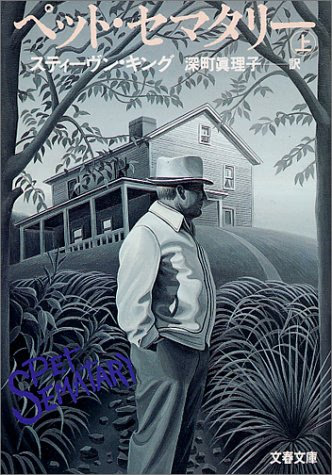
スティーヴン キング (著)『ペット・セマタリー』文藝春秋 1989( Amazon )
-
 和田
和田 -
私が持ってきたのは、ペット・セマ…言いにく…セマタリーっていう本です。
-
 田中
田中 -
(笑)
-
 和田
和田 -
映画は『ペット・セメタリー』っていうタイトルで、原作はセマ…、セマタリーってちょっと読みにくいんですけど、その理由は後ほど。スティーブン・キング原作の映画のなかでもこれは特に好きなので、これなら原作も読めるかなと思って選んでみました。
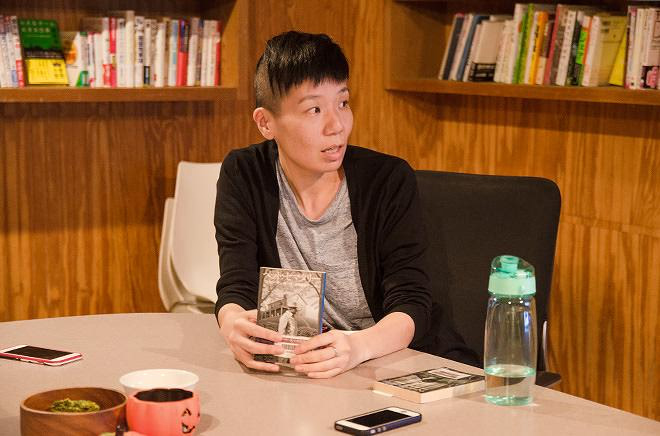
-
 和田
和田 -
タイトルは「ペットのお墓」という意味で、夫婦と幼稚園くらいの娘、よちよち歩きの息子の4人家族の父親が主人公です。彼らがアメリカの田舎町に引っ越してくるところから話は始まります。ある日、家の横に小さな道を見つけて「この道はなんですか?」と隣のおじいさんに聞くと「興味があるなら、今度連れてってあげよう」と、みんなで行くことになります。
そこには近所の子どもたちが作ったペットのお墓があって、子どもなのでお墓の看板のスペルも「Pet Sematary」(正しくは「Cemetery」)と間違ってるんですね。これが小説のタイトル『ペット・セマタリー』になってます。
お墓から帰ると、幼い娘は「うちの猫は絶対死なないよね?」と泣き出してしまいます。
お父さんはちゃんと教えたほうがいいと考えますが、お母さんはトラウマがあって死を素直に受け入れられない。娘に死を説明することをためらったまま、ある日、お母さんと子どもたちが外出中に、猫が車に轢かれて死んじゃうんです。どうしよう、帰ってきた娘にどう言おうとお父さんが焦っていると、隣のおじいさんが「ついてこい!」みたいな感じで言ってきて…
(5分終了の合図)
-
 田中
田中 -
あああ!気になる!
-
 和田
和田 -
例のペットのお墓に埋めるのかと思いきや、その奥にまだ道があるんです。そこには古いインディアンのお墓みたいなのがあって、ここに猫を埋めろと言われて、訳がわからないまま埋めちゃうんですね。
すると3日くらい経って、猫が帰ってくるんです。ただ、ちょっと様子が変。明らかに雰囲気が違う。不思議な感じはするけどまあ良かったかなと、そのまま過ごしていると、今度はよちよち歩きの息子が、トラックに轢かれて死んでしまうんです。
で、あの禁断の土地に埋めに行っちゃう、っていう。
-
 田中
田中 -
うおお〜!やりやがった。
-
 和田
和田 -
その土地は呪われてるというか、一度行くと魅了されちゃうんです。隣のおじいさんも言わなきゃいいのに、その土地に関わるとどうしても誰かに言いたくなる。そして、埋める口実もうまいこと考えちゃうらしいんですね。
お父さんもダメだと分かってるのに、もうどうしても行くしかないみたいな感じになって。埋葬した息子を掘り返して、禁断の場所に行ってしまうんです。

-
 田中
田中 -
うわああ。
-
 和田
和田 -
そこからどうなるか。二転三転して面白いです。
-
 村上
村上 -
スティーブン・キング読んだことなくて。読んでみたいですね。
-
 和田
和田 -
映画を見て結末は知っていましたが、小説は父親の視点で、彼が葛藤する描写がすごく細かくてリアリティがあって…最後まで引き込まれました。読んで良かったです。
『ペット・セメタリー』監督:メアリー・ランバート 1989年 パラマウント映画
読書会をおえて
面白い映画を観ると、その原作が気になるものです。
そんな欲張りな好奇心を全面に出し、映画と本を両方紹介するスタイルで読書会を開いてみました。
本は好きだけど、映画は補足で観たレベルという人もいれば、映画は好きだけど本はあんまり…という人も。「映画化された本」というテーマですが、読書と映画の体験の比重はそれぞれ、その理由もバラバラなのが面白かったです。
みなさんも秋の夜長に、映画と原作本、どちらも味わってみると、また新しい解釈が生まれるかもしれませんね。
次回のテーマは「食事がおいしそうな本」。お楽しみに!
